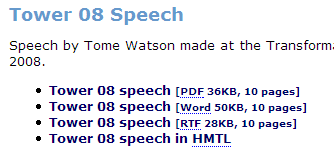Tom Watson publishes (what looks like) a speech announcing the formation of a Power Of Information Taskforce, to be chaired by former LibDem MP Richard Allan (now senior manager of UK&I government affairs at Cisco), taking forward the Power Of Information report by Ed Mayo and Tom Steinberg.
An interim Progress Report on Power was published yesterday… but frankly, there’s nothing especially substantial to report. Plenty of talk about pilots and guidelines, though. I’m keen to see what Jeremy Gould makes of the report’s claim that ‘the government supported a Barcamp initiated by the Ministry of Justice.’ And I’m not sure I’d get too excited about an OPSI discussion forum with ‘over 70 messages’ in it.
This contrasts so sharply with the moves made by Downing Street last week, throwing themselves at the mercy of the Twitterverse – and winning quite a few friends by doing so. No need for lengthy stakeholder consultation, or strategy papers. It was clearly a good idea; so they just did it. (And believe me, No10 aren’t finished yet, not by a long shot. More on that later this week.)
The two most interesting lines in Tom’s speech are, I’d say, the ‘draft guidance on how public servants can use social media’ being put to the Taskforce ‘later this week’ (confirming a rumour I’d heard from elsewhere); and his call for:
more use of techniques commonplace now in the wider world, internal blogs, wikis, discussion forums, shared workspaces, all still quite rare within the machine.
Yes folks, the Minister actively wants you to use blogs and wikis. Your business case just wrote itself.
